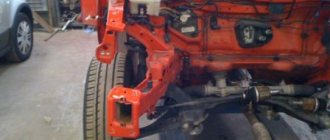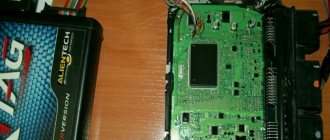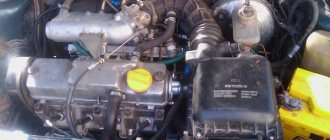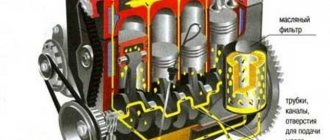It's time to change the spark plugs (30,000 km). I bought a spark plug wrench and a set of spark plugs at the store for 200 rubles for my car brand.
In theory, this procedure is the simplest, but when I began to unscrew the candle, it did not even move a millimeter. All spark plugs are jammed. This spark plug wrench was unable to do its job.
I went to the store to get a normal spark plug wrench. I bought two - one small, the other larger. Unfortunately there was no crank for them. I decided to use a screwdriver instead, but no matter how much effort I put in, the spark plug stays in place.
I already thought that I needed to go to a car service center so that they could remove the spark plug themselves and, if it broke off, they would get it out of the well. What if they don’t say that debris fell into the engine? I decided that I would turn them out myself.
Before replacing the spark plugs, I was in a hardware store and looked at drills. Then it dawned on me - this is an excellent collar. I bought a concrete drill of 8 mm and a length of 210 mm. Fits perfectly.
So, for the job I needed: a 21 mm socket wrench for spark plugs, a drill instead of a wrench.
Disconnected the high voltage wire from the spark plug. To avoid confusion, change the spark plugs and remove the wires one at a time. I wiped everything away from dust and dirt, it would be advisable to also blow it with compressed air from a tire pump (so that dirt and grains of sand wouldn’t get into the cylinder after unscrewing the spark plug), but I didn’t have it on hand, so I carefully screwed it in and out.
You need to unscrew the spark plugs counterclockwise and tighten them clockwise. Each candle took me about 10 minutes. He pressed the knob firmly, but carefully, without swinging, so as not to break the thread.
In the end, I unscrewed all the spark plugs myself. I got a couple of bruises when I had to lean my whole body on the knob and then it would turn and I would fall slightly onto the car :-). Then they got out of it well.
Yes, by the way, the condition of the spark plug can be used to assess the technical condition of the engine. Everything is fine with me. There is no carbon deposits, no cracks on the body.
I wrapped each candle back by hand so as not to damage the thread and then tightened it lightly. I put the high-voltage wire back on.
I started the engine, everything works. Hooray!
P.S. Now I have three 21mm spark plug wrenches. I hope in the future I won’t have any problems with unscrewing the spark plugs, but if anything happens, I’m completely ready.
Did the candle break?! No problem! The other day, grief overtook me. On a free day, it was decided to do an inspection of my car. I drove it into the garage and began checking all the components and assemblies. The case came to the spark plugs, took a spark plug, set it up and a ratchet ( NEVER UNLOCK THE PLUGS WITH A RATCHET
). And at the very first spark plug that I wanted to unscrew, an emergency occurred. The spark plug did not unscrew, I had to apply force, and since I took the tool from a ratchet and the shape looks like a 90 degree angle, when I apply force it turns out that this whole structure is slightly skewed, albeit not by much, but this is enough for it to turn out like this .
Carefully inspect the spark plug. Look for any cracks in the ceramic insulator. Spark plugs are very fragile, and a spark plug that has been discarded, even while still in the box, can be easily cracked. Remember that a cracked insulator will prevent ignition until the engine is under load. This means it can work fine when you return it from the store, and then skip the passes when the customer drives home.
Some technicians do not use a torque wrench when installing spark plugs, and some areas of the engine cannot be used with a torque wrench. Many spark plug sockets have a swivel adapter, and if there is any angle on that swivel, the torque wrench will not be accurate. For these reasons, most spark plugs are either inverted or bent.
You hear a crunch, take the head out and see
Then there was a lot of pee pee pee i.e. I remembered my vocabulary of the great and mighty RUSSIAN language, caressed myself with various warm and gentle words :) And began to scratch my turnip, slightly bald from shock - what to do. I decided that there was nothing I could do to help myself here and the only thing that came to mind was to check if the engine could start and drag me to the service station. He put three coils on the spark plugs, inserted the key into the ignition, crossed himself and turned to start. The engine started immediately and after a successful start, half a second later, there was a frightening strong bang followed by a blow, then I immediately turned off the ignition, my pulse quickened, but I didn’t go to the engine. I’m sitting in the car, afraid to go and remembering a couple dozen more affectionate words addressed to me, and scratching my turnip, which is already pretty bald. About thirty seconds passed and I finally decided to do a truly masculine brave act - the first steps towards the engine. To my pleasant surprise, it wasn't as bad as I imagined.
A spark plug that is too loose will not have good heat transfer and can cause the fork to overheat. This may result in ignition or "spark strike". Loose plugs can allow compression to leak through the threads, and over time this will damage the threads. A spark plug that has excessive torque will stretch the threads and cause them to break during installation or during removal the next time. Stretched threads are also more likely to seize over time and be difficult or impossible to remove without damaging the cylinder head.
When you enlarge the picture, you can see that the central electrode is missing and the grounding electrode is visible in the depths.
After this, it became clear that the pop and impact was caused by the flying out central electrode, I spent about 5 minutes searching for it, and soon I saw this picture.
Sometimes you can crack the insulation on the spark plug if you overtighten it. This will cause it to misfire under load. Some technicians will tell you to always use anti-seize on the spark plug threads, but many manufacturers tell you not to do this. Many problems arise when threads are captured too tightly. Anti-seize can squeeze on the electrode and cause it to misfire, and it can squeeze on the sealing surface and change the heat range.
Because of these problems, most manufacturers recommend against using anti-grab. In this article they state that the metal coating of the shell acts as a "lubricant" that lifts away from the main body of the spark plug during removal, preventing damage to the spark plug and the threads in the cylinder head. What this does not mean is that when you reinstall that spark plug you will no longer have anti-seize protection.
Preparation
Before you start unscrewing the igniters, you need to prepare. First, you need to wait until the engine has completely cooled down. When heated, the aluminum cylinder head expands and clamps the spark plugs into the threads, making it impossible to unscrew them. In addition, a cold unit will protect you from burns.
The simple fact is that almost every time you try to remove these spark plugs, at least one of them breaks into the cylinder head, or worse, the threads from the cylinder head are damaged or come out of the spark plug. The picture below shows a spark plug that has been punched inside the cylinder head.
Problem #1: The spark plug is stuck in the cylinder head or has broken. Also the cylinder head is aluminum, the spark plug has steel and other components, and 2 dissimilar metals will lead to corrosion. Recommended steps to try to remove the plugs without breaking them.
For the twisting procedure, you need to prepare the following tools and materials:
- torque wrench;
- special hexagon;
- compressor;
- WD-40 oil.
After the engine has cooled, you need to disconnect all contacts. Using special means and a clean rag, you must thoroughly clean the location of the heating elements from dirt so that nothing falls into the spark plug well.
Using a compressor with a thin tube or other device that pumps air, you need to blow out the well itself. This must be done very carefully, as there is usually a lot of debris and dirt in the nest. After blowing, you need to fill the socket with WD-40 oil. It will lubricate the thread and make it easier to unscrew. You can start work 10-15 minutes after the oil has been added.
Of course, I like doing this type of work and don't mind it at all. Use high quality, high quality tools that will allow you to get a nice firm and square position on each spark plug. The passenger side of the engine is where most of the damage occurs, so pay special attention to them.
The spark plugs are loose or actually removed directly from the cylinder head and tend to pull or pull the threads off of them. Believe it or not, this actually happens, and it happens very often. Typical symptoms include a very loud exhaust noise coming from the engine bay area, an immediate misfire, and most likely a check engine light will soon follow. Oh, and another symptom is that there is probably a spark plug or spark plug pieces located somewhere in the engine bay, and your ignition coil may or may not be attached to the top of that spark plug.
Description
A spark plug wrench is a special professional hand tool made of high-strength materials that allows you to screw in and unscrew spark plugs in engines. The instrument is a long tube with a head attached to it. The choice of spark plug wrench and head depends on the size of the spark plug being mounted. Often, auto repair shops use spark plug wrenches with an extended tube containing special pullers.
In the production of spark plug wrenches, carbon steel is used that has gone through several stages of hardening, which significantly increases its strength. The use of high-strength materials in the manufacture of spark plug wrenches is due to the need for their daily use under conditions of heavy loads.
Anti-corrosion agents are used to coat the surface of spark plug keys. Equipping the keys with hinges, rubber bushings and spring clamps that provide reliable clamping allows you to hold the mounted spark plug in the cavity of the pipe, which greatly facilitates the process of car repair. Also, for convenience of work, there are magnetic spark plug keys and separate heads on the market that allow you to fix the tightening.
First step
First of all, you need to find out where they are located in the engine.
This is the primary stage. In many 4-cylinder units, the spark elements are located on the side or on top. In 8-cylinder analogues they are positioned on the sides. It is very rare to see such a picture: one part that supplies a spark on each cylinder.
An important condition before the intended work: the engine must be cold.
How to change spark plugs yourself? If you find it difficult to find the parts you need, look for black wires. They are located along the engine. By following them, you can find the details you are looking for.
Read the instructions for your machine. There is the necessary information to carry out this operation.
Spark plug
Second stage. Preparation of tools
Having found out the positions and types of spark plugs installed in your car, you should prepare a certain set of tools for the job. It is quite modest: new working parts and a socket wrench. The key must have a screw-out attachment.
In years past, a special probe was still needed. With its help, the distance between the electrodes was calculated. How to change spark plugs today? Most models have built-in elements with an already marked gap. This option is available today for all new spark sources for cars. The work can be greatly facilitated by placing the following components near the machine:
- container with technical alcohol,
- dry rag
- a small canister filled with air.
When to change spark plugs
According to the technical inspection regulations, spark plugs on Priora must be replaced every 30 thousand kilometers. However, this interval is not always maintained, and they are subject to emergency replacement.
The need for replacement can be determined by engine performance. It becomes unstable at idle, the engine starts poorly, and increased fuel consumption is observed. Also, her appearance can tell about her condition. First of all, you should pay attention to burnt electrodes, both central and side. Cracks on the insulator of the central electrode are also a bad signal; chips in it should also be a warning. General sootiness indicates poor ignition, and gasoline or oil indicates its complete inoperability.
Removing old parts
It is important to follow the following steps:
How to remove spark plugs
It is necessary to pull the wire terminal from the power unit. The wire is grabbed as close to the connector as possible. The procedure is performed extremely carefully. The task is to remove the terminal. Under no circumstances should you pull the wire when removing it from the plug. This way you can cause serious damage to him.
A socket wrench is placed on the part being removed. To unscrew the part from the body, use the ratchet. All these actions are performed slowly and very carefully.
When checking here, it is worth making sure whether the plugs need to be replaced. This is easy to find out: one part from the whole set is removed and carefully studied. Its gap and the condition of the contacts are inspected. If contact burnout is detected, you will have to urgently purchase new plugs. Burnt-out plugs are removed one at a time, one at a time. It is important to discover their positions.
The correct operation of spark sources is carried out in a certain algorithm. And if the wires are connected incorrectly, the engine will function with serious interruptions. And eventually it may fail.
When replacing more than one part, pay special attention to the wires . They can be marked with a marker or small pieces of electrical tape. Both the spark plug and each wire are designated in this way even before the replacement procedure. This way you will prevent negative consequences and incorrect connection of these components.
If such a connector cannot be removed with bare hands, then a special puller will help solve this dilemma.
Puller
This operation is performed very carefully. The thread must not be damaged.
Stage two. Extraction
The part to be replaced is removed. This action uses a special wrench with an attachment. It rotates counterclockwise. Huge efforts are not required here. You should not pull the candle out of its position. This will only ruin the thread. These manipulations are also performed extremely carefully. If there are difficulties, you can rotate clockwise and then counterclockwise again.
Stage three. Cleaning
This is where the spark plug hole is cleaned. Cleaning is mandatory even before installing new spark plugs. Use technical alcohol and the same rag again. And only after the dirt has been completely eliminated from the threads can you proceed to further actions.
The electrodes are carefully inspected for carbon deposits. In certain cases, spark plugs may not operate stably due to dirt accumulations between the electrodes.
If the side of the spark plug that is placed inside the engine is covered with oil, it means that the piston and oil rings are worn out. In this situation, resort to the services of specialists from the service. If these parts are in normal condition, then their color is brownish.
What does the color of soot indicate?
When inspecting the electrode and thermal cone of the insulator of the old element, you should pay attention to the color of the carbon deposits. If black dry carbon is present, it can be concluded that the engine is being used at low speeds or idling. If the carbon is black in color and has an oily structure, we can talk about wear on the cylinders and piston rings, as well as an excessive oil level in the crankcase. If a part, for example an ngk, is operating under normal conditions, its insulator will be light gray or light brown. There is no soot in this case.
Installation of new products
Today, as a rule, the following types of candles are presented in sales:
- Platinum products.
- Iridium products.
- Yttrium products.
Types of spark plugs
It is very important to replace the spark plugs correctly. There are many combinations and parameters. Their price range: 200 – 800 rubles. The materials used are different. Versions made from precious metals are much more expensive than versions made from standard materials. Reason: such coatings are much more resistant to wear. If you have any doubts about the choice of candles, contact the seller for advice.
It is advisable to purchase candles with parameters and threads similar to those of the products being replaced. You should not purchase candles with smaller parameters. The manufacturer specifically specified these dimensions. And stick to these values. Consulting with a specialist will help you make sure that the chosen option is correct. Don't be lazy to spend a few minutes on this. Otherwise, you will soon have to solve new dilemmas.
As a rule, spark plugs are purchased whose gap is fixed or adjustable. If you need to constantly check your candles and make some adjustments to them, you should opt for the second option. With this choice, you will get controlled contacts. First, make sure that the gap is optimal for your car. To do this, you need to carry out an independent check: the candles are taken out of the packaging, checked, and this parameter is measured.
Spark plug replacement procedures
The purchased candle is inserted into the candle hole. This action is performed separately for each component. Screwing is done by hand first. And you need to clamp the part using a key. It's important not to overdo it here. Otherwise the thread will be torn off. Screwing occurs with moderate effort.
If your car's engine is made of aluminum, then the spark plugs must be lubricated before installation. Special lubricant is used. It is applied in a thin layer to the thread. It will not allow conflict between different metals.
Then all wires are connected. Pay attention to the markings you previously made on them. This way you can connect the wires without errors. All connectors fit tightly together.
It is very important to check how the cap is installed. Gently pull it towards you. If it does not fly off, it means that its installation was carried out correctly.
Replacement problems
It is worth noting that some problems may arise during replacement. For example, an old part may be damaged. In this case, you need to figure out how to unscrew the broken spark plug. This can be done using drilling. This is a rather labor-intensive procedure, and it should be entrusted to the specialists of a car service center. They know exactly how to remove a broken spark plug and can do it correctly.
It is also important to install a repaired spark plug when the thread was previously torn off. If the candle has retained its functionality, but the thread is torn off, then a screwdriver or a foot for the candle will help correct the situation. The screwdriver allows you to install a working part into the socket. It is important that the screwdriver has a diameter suitable for the specific part.
Appearance of the screwdriver
During repair work, the screwdriver is installed in the head. The screwdriver assumes there is space for installing the spark plug. Once the screw is installed correctly, you can screw the spark plug into it. At the same time, the screwdriver allows for the correct installation of the part in a new place for it. Thus, the screwdriver will help correct the situation in case of a broken thread.
If the ignition elements are stuck, you can solve the problem in different ways. With the first of them, dismantling the head is not required, with the second, the head is removed, after which the spark plug is drilled out. Such approaches will solve the problem if the parts have become stuck.
Important Tips
- The spark plugs must be replaced with a new set, even if only one such part has failed.
- Before the replacement procedure, wash the car yourself or at a car wash. Such measures will significantly reduce the possibility of dirt entering the engine cylinders.
- High voltage wires also change completely, that is, their entire set must be replaced.
- High quality spark plug connectors have rubber seals. They help to fix the candles well.
How to unscrew a spark plug without a spark plug wrench?
Motorists often encounter a situation where the key for the spark plugs is missing. In this case, you can do this:
- Pour any universal lubricant onto the spark plug, for example WD-40. Wait 20-30 minutes.
- Gently tap the candle with a small hammer.
- Try to unscrew it, and to enhance the rotational movement, use an additional device - a wrench.
Other nuances
How to change spark plugs correctly? It’s very good if you know what metal your car’s engine is made of. This aspect is quite important when replacing spark plugs. If this unit is aluminum, then before the operation of replacing the spark plugs, it must be warmed up. Without these actions, there is a high risk of thread damage.
The installed elements are tightened carefully. If one of these parts is not tightened, it may soon fly out of the engine. This will happen during its operation. And such a consumable will break the thread.
Make sure the gap is set correctly. Its position affects the operation of the motor.
Incorrect connection of high voltage cables will cause malfunctions of the entire system. Preventive measures here are associated with studying the instructions.
If the candle you purchased is longer than the old product, you should not screw it in. Long threads may contact the piston. And in the process of work it will be damaged.
Never guess with parameters when purchasing. Also, do not place different washers under the spark plugs. In such cases, professional advice or useful information that can be found on the Internet or in the library will help you.
Replacing spark plugs with your own hands is not a difficult task, but it requires a responsible approach.
What types of spark plug wrenches are there?
To make it easier for the master to decide which spark plug wrench is better, you need to familiarize yourself with all their varieties that are on sale:
- Articulated
. This is the most popular device, which is very convenient to use, since the movable connection of the key on hinges allows you to better adapt to the location of the candle. A tubular spark plug wrench carefully dismantles the element and helps install a new one. - T-shaped
. Its design is more rigid than the previous type. And although it also has a hinge, it is installed at a slight angle of inclination. Due to its rigidity and strength, such a spark plug wrench can transmit great forces during operation. Many models are equipped with a magnet that keeps the candle from falling. - Tubular
. This is the simplest and most budget option. There is no hinge in this way, but it is driven by a simple crank that comes with it. The advantage of this device is the presence of two heads that have different diameters. This makes the tubular spark plug wrench more functional and versatile.
Spark plug size
To tighten the candles, use wrenches that differ in thread diameter. There are long and short spark plug keys. Depending on the situation, the master may need keys of the following sizes:
- 14 and 16 mm
- they are used for repairing internal combustion engines of modern brands. - 19 mm
– used for motorcycle engines. - 20.8 (21 mm)
- standard key of the old European standard. Used in the repair of engines with two valves per cylinder. This model is useful for any Soviet passenger cars. - 22 mm
- used to replace old spark plugs on ZIS and ZIL vehicles. - 24 mm
- keys intended for spark plugs of the M8 brand.










